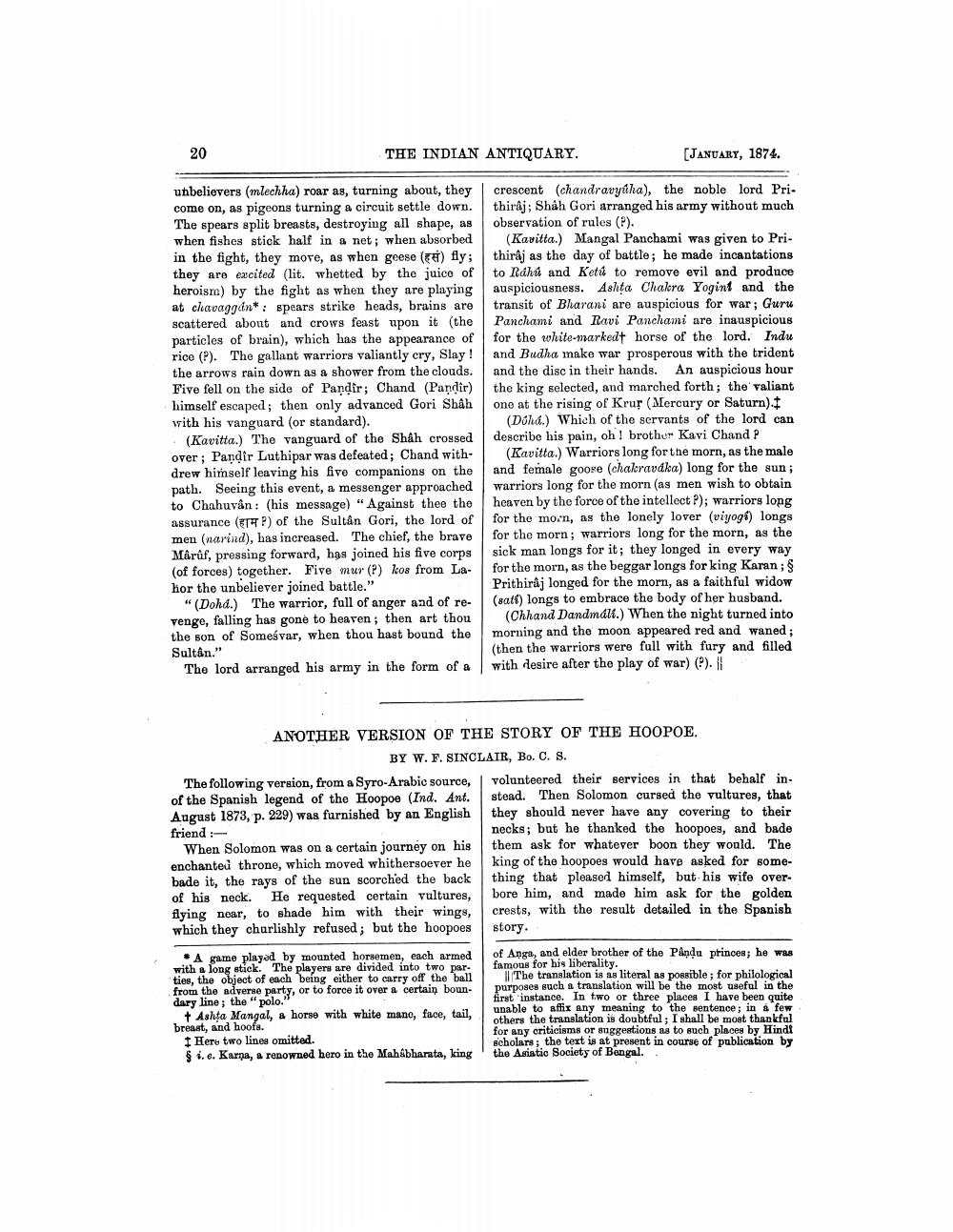________________
20
THE INDIAN ANTIQUARY.
(JANUARY, 1874.
unbelievers (mlechha) roar as, turning about, they come on, as pigeons turning a circuit settle down. The spears split breasts, destroying all shape, as when fishes stick half in a net; when absorbed in the fight, they move, as when geese () fly; they are excited (lit. whetted by the juice of heroisma) by the fight as when they are playing at chavaggan* : spears strike heads, brains are scattered about and crows feast upon it (the particles of brain), which has the appearance of rico (P). The gallant warriors valiantly cry, Slay! the arrows rain down as a shower from the clouds. Five fell on the side of Pandir; Chand (Pandir) himself escaped; then only advanced Gori Shah with his vanguard (or standard).
(Kavitta.) The vanguard of the Shâh crossed over; Pandir Luthipar was defeated; Chand withdrew himself leaving his five companions on the path. Seeing this event, a messenger approached to Chahuvân: (his message) " Against thee the assurance (TTP) of the Sultan Gori, the lord of men (narind), has increased. The chief, the brave Märüf, pressing forward, has joined his five corps (of forces) together. Five mur (?) leos from Lahor the unbeliever joined battle."
" (Dohd.) The warrior, full of anger and of revengo, falling has gone to heaven; then art thou the son of Someávar, when thou hast bound the Sultân."
The lord arranged his army in the form of a
crescent (chandravyiha), the noble lord Prithiraj; Shah Gori arranged his army without much observation of rules (?).
(Kavitta.) Mangal Panchami was given to Prithiraj as the day of battle; he made incantations to Rahů and Ketú to remove evil and produce auspiciousness. Ashta Chalera Yogint and the transit of Bharani are auspicious for war; Guru Panchami and Ravi Panchani are inauspicious for the tohite-markedt horse of the lord. Indu and Budha make war prosperous with the trident and the disc in their hands. An auspicious hour the king selected, and marched forth; the valiant one at the rising of Krur (Mercury or Saturn)
(Doha.) Which of the servants of the lord can describe his pain, oh! brothur Kavi Chand P
(Kavitta.) Warriors long for the morn, as the male and female goose (chakravdka) long for the sun; warriors long for the morn (as men wish to obtain heaven by the force of the intellect?); warriors long for the morn, as the lonely lover (viyogi) longs for the morn; warriors long for the morn, as the sick man longs for it; they longed in every way for the morn, as the beggar longs for king Karan; Prithiraj longed for the morn, as a faithful widow (sat) longs to embrace the body of her husband.
(Chhand Dandmaut.) When the night turned into morning and the moon appeared red and waned ; (then the warriors were full with fury and filled with desire after the play of war)).
ANOTHER VERSION OF THE STORY OF THE HOOPOE.
BY W.F. SINCLAIR, Bo. C. S. The following version, from a Syro-Arabic source, volunteered their services in that behalf inof the Spanish legend of the Hoopoe (Ind. Ant. stead. Then Solomon cursed the vultures, that August 1873, p. 229) was furnished by an English they should never have any covering to their friend
necks; but he thanked the hoopoes, and bade When Solomon was on a certain journey on his them ask for whatever boon they would. The enchanted throne, which moved whithersoever he king of the hoopoes would have asked for somebade it, the rays of the sun scorched the back thing that pleased himself, but his wife overof his neck. He requested certain vultures, bore him, and made him ask for the golden flying near, to shade him with their wings, crests, with the result detailed in the Spanish which they charlishly refused; but the hoopoes story.
A game played by mounted horsemen, each armed with a long stick. The players are divided into two par. ties, the object of each being either to carry off the ball from the adverse party, or to force it over a certain boundary line, the "polo."
+ Ashta Mangal, a horse with white mano, face, tail, breast, and hoofs.
Here two lines omitted. .e. Karna, a renowned hero in the Mahabharata, king
of Angs, and elder brother of the Pandu princes; he was famous for his liberality.
The translation is as literal as possible; for philological purposes such a translation will be the most useful in the first instance. In two or three places I have been quite unable to affix any meaning to the sentence; in a few others the translation is doubtful; I shall be moat thankful for any criticisms or suggestions as to such places by Hindt scholars; the text is at present in course of publication by the Asiatic Society of Bengal.




